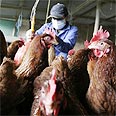
Could bird flu promote peace?
A leading Israeli health official says bird migration could bring a medical, not to mention economic, disaster to Israel, the Palestinian Authority, and Jordan. He says it's a rare chance for all sides to work together. First in a two-part series
Avian influenza (bird flu) is an infectious disease caused by a large group of different flu viruses that infect birds naturally. Dr. Alex Leventhal, the Director of Public Heath Services in the Israeli Ministry of Health along with other experts worldwide, believes avian flu will reach our region and Africa as well.
"We don't know when, but it is predictable," he says. "The migratory birds pass over Israel, Palestine and Jordan twice a year. We are speaking about more than five hundred million birds of which some may be carriers of the virus. This scenario, which we are afraid of, is possible. This is what occurred in Romania, Turkey and Croatia," explained Leventhal.
Dr. Leventhal is challenged by several difficult elements in his daily battle preparing for avian flu. "The problem is that the migratory birds descend for less than one day and fly away again. They may come in contact with poultry and perhaps transmit the virus to them. The disease in poultry is contagious and fatal to the husbandry" warned Leventhal.
A lack of information and an inability to acquire tracking information of the birds makes Leventhal's job even tougher.
"Only when all poultry are closed off are they totally immune to the viruses. Along with our Palestinian and Jordanian colleagues, we are planning how to handle a situation if we find a single bird with avian flu. We would need to destroy all poultry within nine kilometers (five miles) of that region," he says.
But Dr. Leventhal is confronted with doubt and alarm from within the health and agriculture ministries, as well as the public. Many people believe that even more poultry should be destroyed. Leventhal explains that in countries where avian flu was identified, consumption of poultry decreased 60 percent.
'No vaccine for future pandemics'
Until now, the damage has been the destruction of about 160 million poultry and an economic loss that ranges between USD 8-9 billion worldwide.
And this is just the beginning. "In our region, economic catastrophe may occur. The damage could be huge. So the situation requires cooperative efforts," he remarked.
Leventhal is faced with yet another challenge: understanding how to implement usual public health measures such as vaccinations and treatments to deal with infections and prevention of epidemics.
"Generally, there is a vaccine for flu, but for future pandemics there is no vaccine. Although, vaccines are the best way to prevent infection, the other option is treatment with the drug, Tamiflu, which exists but is limited in supply," he says.
Israel's health and agriculture ministries have a joint plan, including measures and recommendations for preventing avian flu and dealing with the identification of the disease in the region. The Ministry of Health has published the plan on its website in Hebrew, including WHO recommendations.
For example, travelers to countries infected with avian flu, should limit contact with birds or excretion and eat eggs and other poultry products only after cooking.
Dr. Leventhal believes in making people aware of the subject and what to do when there is a case of infection, especially, how to prevent further infection. The ministry deals with the public by keeping them informed, giving them all the facts, without hiding any information.
"If the avian flu becomes a pandemic, there is a total plan for how to handle the society's health, hospital procedures, including distribution of drugs," explains Dr. Leventhal.
In case of pandemic
In case of a pandemic, the Ministry of Defense will oversee a national plan for the entire country.
"We are working together with the Palestinians and the Jordanians. We met with the Jordanians on the King Hussein Bridge. Also, there was a meeting with Palestinian officials from the Ministry of Health including the veterinary services in Beit El in Ramallah. The Jordanians suggested a tripartite meeting which we will organize within a week," Leventhal said.
"We decided the Israelis, the Jordanians and the Palestinians should share strategic plans and try to work in conjunction. We have good cooperation with the Palestinian Authority. There are excellent professionals like Dr. Asa'd Ramlawi and Dr. al-Masri.
We told them that we are ready to help them to be able to handle their situation. My teacher taught me an Arabic proverb, ‘A close neighbor is better than a distant brother.’ I hope to see other countries like Lebanon, Syria, and Egypt working with us as well."
Dr. Leventhal believes, ironically, that such a global threat may create an opportunity for cooperation and efforts towards peace. He is optimistic that the world can overcome the pandemic threat.
"The birds, the viruses, and the microbes are not prevented by political borders. I believe we can do good things. I feel that the atmosphere is changing. I hope the Palestinians in Gaza feel the same thing too," comments Leventhal.
Article reprinted with permission from bridges' Israeli-Palestinian public health magazine sponsored by World Health Organization. Bridges is produced by Palestinian and Israeli academics and health professionals (www.bridgesmagazine.org)










